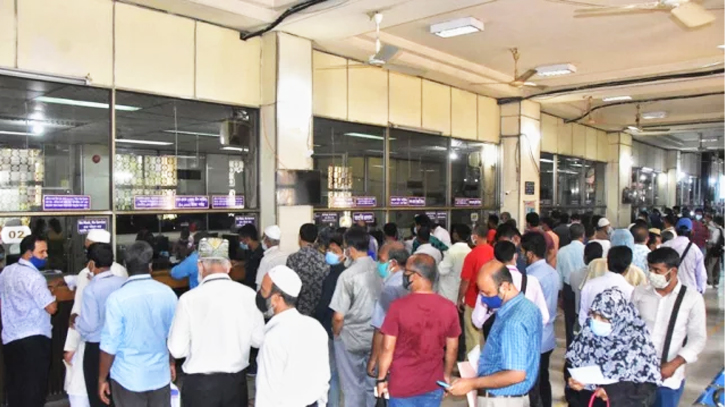
Photo: Collected
Bangladesh’s financial sector is passing through a transitional period like other sectors of the country after the fall of Sheikh Hasina’s government on August 5.
In the aftermath of Hasina's exit, Banks and Financial Institutions (FIs), the key elements of the financial sector have fallen into a leadership crisis, as many chairmen have remained absent and Managing Directors (MDs) of some banks faced internal pressure by deprived employees in office following the recent changeover, said a mid-level official of Bangladesh Bank (BB).
Chairmen of many banks were in hiding, and would not continue as they were appointed in political consideration and made many controversial decisions against the bank. As a result, the defaulted loan volume of some banks soared in multiple folds in the last few years, the official said.
He pointed out that the new interim government was formed on Thursday, and now the wheels of the financial sector are getting pace as the trust returns among the businesses and common people.
After the August 5 changeover, the BB Governors and deputy governors resigned. State-owned Sonali Bank and private-sector Islami Bank are the two largest banks in the country, and they operate the lion's share of financial transactions in Bangladesh.
But this has created an internal problem as the chairmen and directors have gone into hiding or out of the country. As a result, many important decisions are spent on making a policy-level decision and clearance.
Besides, several top-level officials from a dozen banks have resigned, leading to disruptions in banking operations, including a halt in loan approvals and disbursements, said Abdul Al-Mahmud, an additional managing director of a leading private bank.
“Former promoter directors take control of Social Islami Bank Limited and struggle for ownership is ongoing at National Bank. Islami Bank Bangladesh officials allow no reps from S Alam Group. Partex Group is trying to reclaim United Commercial Bank PLC,” he opined.
Banks previously controlled by companies associated with the ousted Awami League government have experienced significant power shifts and unrest in recent days, following the government's fall, he said.
Several top-level officials from these banks have resigned, leading to disruptions in banking operations, including a halt in loan approvals and disbursements.
Protests erupted in several banks on Thursday, with demands to identify and take action against those involved in money laundering, to cancel illegal appointments, and to reinstate employees who were arbitrarily dismissed.
UNB contacted the finance adviser to the interim government, Dr. Salehuddin Ahmed, to ask whether the situation would be normal soon.
Dr. Salehuddin, a former governor of the central bank, said that all banks and financial institutions have been asked to continue regular banking operations as per rules, and it was only a matter of time before normalcy returned, as they were working to fill up the managerial gap.
Messenger/UNB/Sourov








